|
De Britse schrijver en regisseur Hanif Kureishi werd geboren op 5 december 1954 in Bromley, Kent. Zie ook alle tags voor Hanif Kureishi op dit blog.
Uit:The Last Word
“Harry Johnson gazed out of the window of the train at the English countryside and thought that not a moment passed when someone wasn’t telling a story. And, if his luck held for the rest of the day, Harry was about to be employed to tell the story of the man he was going to visit. Indeed, he had been chosen to tell the whole story of this important man, this significant artist. How, he wondered, with a shudder, did you begin to do that? Where would you start, and how would the story, which was still being lived, end? More important, was he, Harry, capable of such a task?
Peaceful England, untouched by war, revolution, famine, ethnic or religious disturbance. Yet, if the newspapers were correct, Britain was an overcrowded little island, teeming with busy immigrants, many clinging to the edges of the country, as on a small boat about to capsize. Not only that, thousands of asylum seekers and refugees, desperate to escape disturbance in the rest of the chaotic world, were attempting to cross the border. Some were packed in lorries, or hung from the undercarriages of trains; many were tiptoeing across the English Channel on tightropes slung across the sea, while others were fired from cannons based in Boulogne. Ghosts had it easy. Meanwhile, apparently, since the financial crash, everyone on board the country was so close together and claustrophobic they were beginning to turn on one another like trapped animals. With the coming scarcity—few jobs, reduced pensions, and meager social security—people’s lives would deteriorate. The postwar safety Harry and his family had grown up in was gone. Yet, to Harry now, it seemed as if the government was deliberately injecting a strong shot of anxiety into the body politic, because all he could see was a green and pleasant England: healthy cattle, neat fields, trimmed trees, bubbling streams, and the shining, early spring sky above. It didn’t even look as though you could get a curry for miles.
There was a whoosh, and beer spattered his face. He turned his head. Rob Deveraux, sitting opposite Harry and cracking open another tin, was a respected and innovative publisher. He had approached Harry with the idea of commissioning him to write a biography of the distinguished writer, Indian-born Mamoon Azam, a novelist, essayist, and playwright Harry had admired since he was a teenage book fiend, a nerdy connoisseur of sentences, a kid for whom writers were gods, heroes, rock stars. Harry was immediately responsive and excited. After years of study and obedience, things were turning good for him, as his teachers had predicted if he concentrated his thoughts and zipped his fly and lip. This was his break; he could have wept with relief and excitement. »
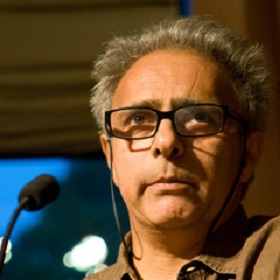
Hanif Kureishi (Bromley, 5 december 1954)
De Oostenrijkse schrijver en taalkundige Alois Brandstetter werd op 5 december 1938 in Aichmühl bei Pichl, Oberösterreich geboren. Zie ook alle tags voor Alois Brandstetter op dit blog.
Uit: Meine besten Geschichten
“Einladungen zu Lesungen freuen die Dichter, wenn auch die berühmteren Kollegen solche Einladungen kaum annehmen, ja meistens nicht einmal beantworten. "Habe weder Zeit noch Lust", hat uns Ernst Jünger seinerzeit ins Studentenheim geschrieben. Der Großteil der Schriftsteller rührt nicht einmal das Ohr, kaum die Schreibmaschine und sich sicher nicht vom Fleck, um ein Zeugma zu gebrauchen. Was soll's! Einladungen sind jedoch nicht gleich Einladungen, Einladungen ins Ausland, schon gar ins fremdsprachige, sind zum Beispiel etwas Besonderes. Die Erwartung aber, daß man dort mit seinen artifiziellen Subtilitäten verstanden wird, woher einen die mit etlichen rührenden Grammatikfehlern und überhaupt im Stil der Goethezeit geschriebene Invitation erreicht, ist eher gering. Will man sich aber nicht dem Vorwurf des Nationalismus aussetzen, wird man wohl reisen müssen. Bei allem, was gerade wir anderen Völkern angetan haben, ist das bißchen Unverstandensein, oder nur Nichtverstandenwerden, auch kein heroischer Akt der Wiedergutmachung oder gar Sühne, obwohl das Leiden des Autors beträchtlich sein kann! Wozu war der ganze stilistische und idiomatische Aufwand jetzt gut! Da hatte man sich gleich auf Infinitive und Nennformen beschränken können. Doch kann einem Unverständnis auch bei Landsleuten passieren. Nachdem ich bei einer Veranstaltung zum Thema "Dorf" im Innsbrucker Funkhaus einen Text aus meinem Buch "Vom Schnee der vergangenen Jahre" gelesen hatte, fragte mich anschließend ein Einheimischer am Kaffeeautomaten der Kantine, nachdem er mich zu seiner Verblüffung als den wiedererkannte, der vorhin auf der Bühne ins Mikrophon gesprochen hatte: "War das Gesätzchen eppa von Ihnen selber, was Sie da vorgerezitiert haben?" Und nachdem ich dies bejahen durfte, meinte er voll Bewunderung: "Was Sie nit sagen, alles eigene Fechsung! Dos wor nit schlecht, wohl, das war fein guat, mein Herr!"
Tirol ist immerhin Österreich.“
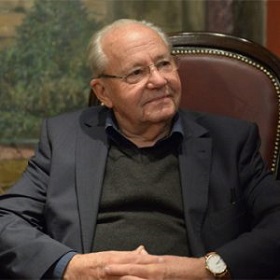
Alois Brandstetter (Aichmühl, 5 december 1938)
De Amerikaanse schrijfster Joan Didion werd geboren in Sacramento Valley op 5 december 1934. Zie ook alle tags voor Joan Didion op dit blog.
Uit: The Year of Magical Thinking
"And then—gone." In the midst of life we are in death, Episcopalians say at the graveside. Later I realized that I must have repeated the details of what happened to everyone who came to the house in those first weeks, all those friends and relatives who brought food and made drinks and laid out plates on the dining room table for however many people were around at lunch or dinner time, all those who picked up the plates and froze the leftovers and ran the dishwasher and filled our (I could not yet think my) otherwise empty house even after I had gone into the bedroom (our bedroom, the one in which there still lay on a sofa a faded terrycloth XL robe bought in the 1970s at Richard Carroll in Beverly Hills) and shut the door. Those moments when I was abruptly overtaken by exhaustion are what I remember most clearly about the first days and weeks. I have no memory of telling anyone the details, but I must have done so, because everyone seemed to know them. At one point I considered the possibility that they had picked up the details of the story from one another, but immediately rejected it: the story they had was in each instance too accurate to have been passed from hand to hand. It had come from me.
Another reason I knew that the story had come from me was that no version I heard included the details I could not yet face, for example the blood on the living room floor that stayed there until José came in the next morning and cleaned it up.
José. Who was part of our household. Who was supposed to be flying to Las Vegas later that day, December 31, but never went. José was crying that morning as he cleaned up the blood. When I first told him what had happened he had not understood. Clearly I was not the ideal teller of this story, something about my version had been at once too offhand and too elliptical, something in my tone had failed to convey the central fact in the situation (I would encounter the same failure later when I had to tell Quintana), but by the time José saw the blood he understood.
I had picked up the abandoned syringes and ECG electrodes before he came in that morning but I could not face the blood.
In outline.
It is now, as I begin to write this, the afternoon of October 4, 2004.”
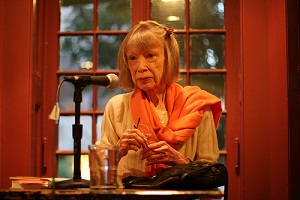
Joan Didion (Sacramento Valley, 5 december 1934)
De Engelse dichteres en schrijfster Christina Georgina Rossetti werd geboren in Londen op 5 december 1830. Zie ook alle tags voor Christina Rossetti op dit blog.
A Daughter Of Eve
A fool I was to sleep at noon,
And wake when night is chilly
Beneath the comfortless cold moon;
A fool to pluck my rose too soon,
A fool to snap my lily.
My garden-plot I have not kept;
Faded and all-forsaken,
I weep as I have never wept:
Oh it was summer when I slept,
It's winter now I waken.
Talk what you please of future spring
And sun-warm'd sweet to-morrow:
Stripp'd bare of hope and everything,
No more to laugh, no more to sing,
I sit alone with sorrow.
From Sunset To Star Rise
Go from me, summer friends, and tarry not:
I am no summer friend, but wintry cold,
A silly sheep benighted from the fold,
A sluggard with a thorn-choked garden plot.
Take counsel, sever from my lot your lot,
Dwell in your pleasant places, hoard your gold;
Lest you with me should shiver on the wold,
Athirst and hungering on a barren spot.
For I have hedged me with a thorny hedge,
I live alone, I look to die alone:
Yet sometimes, when a wind sighs through the sedge,
Ghosts of my buried years, and friends come back,
My heart goes sighing after swallows flown
On sometime summer's unreturning track.
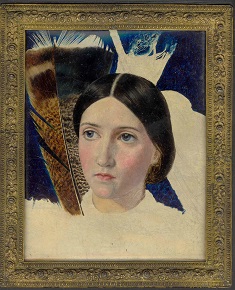
Christina Rossetti (5 december 1830 - 27 december 1894)
Portret door John Brett, 1857
De Russische dichter Fjodor Tjoettsjev werd geboren op 5 december 1803 in Ovstug in het gouvernement Orjol. Zie ook alle tags voor Fjodor Tjoettsjev op dit blog.
Autumn Evening
The light of autumn evenings seems a screen,
Some mystery with tender glamor muffling. . . .
The trees in motley, cloaked in eerie sheen,
The scarlet leaves that languid airs are ruffling,
The still and misty azure, vaguely far,
Above the earth that waits her orphan sorrow,
And bitter winds in gusty vagrance are
Forerunners of a bleak, storm-driven morrow.
The woods are waning; withered is the sun;
Earth shows the smile of fading, meekly tender
As the high shyness of a suffering one,
In noble reticence of sad surrender.
Oh, thou, my wizard soul
Oh, thou, my wizard soul, oh, heart
That whelming agony immerses,
The threshold of two universes
In cleaving these, tears thee apart.
And so two alien worlds are thine:
Thy day of morbid passionate living,
Thy sleep, vague revelations giving
Of spirits secret and divine.
Then let the tortured bosom beat
With fatal passion and vagary;
The soul is fain, even as Mary,
To cling forever to Christ's feet.
Vertaald door Babette Deutsch en Avrahm Yarmolinsky
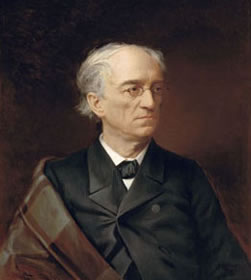
Fjodor Tjoettsjev (5 december 1803 – 27 juli 1873)
Portret door Stepan Aleksandrovsky, 1876
De Amerikaanse schrijver, journalist en columnist Calvin (Bud) Marshall Trillin werd geboren op 5 december 1935 in Kansas City, Missouri. Zie ook alle tags voor Calvin Trillin op dit blog.
Uit: Quite Enough of Calvin Trillin
“There really was a collie named Chubby. I wouldn't claim that the secret about him qualifies as certifiably traumatic, but maybe it explains an otherwise mysterious loyalty I had as a boy to the collie stories of Albert Payson Terhune. We owned Chubby when I was two or three years old. He was sickly. One day Chubby disappeared. My parents told my sister, Sukey, and me that he had been given to some friends who lived on a farm, so that he could thrive in the healthy country air. Many years later-as I remember, I was home on vacation from college-Chubby's name came up while my parents and Sukey and I were having dinner. I asked why we'd never gone to visit him on the farm. Sukey looked at me as if I had suddenly announced that I was thinking about eating the mashed potatoes with my hands for a while, just for a change of pace.
"There wasn't any farm," she said. "That was just what they told us. Chubby had to be put to sleep."
"Put to sleep!" I said. "Chubby's gone?"
Somebody-my mother, I think-pointed out that Chubby would have been gone in any case, since collies didn't ordinarily live to the age of eighteen.
"Isn't it sort of late for me to be finding this out?" I said.
"It's not our fault if you're slow on the uptake," my father said.
I never found myself in a memoirist gathering that required me to tell the story of Chubby, but, as it happened, I did relate the story in a book. A week or so later, I got a phone call from Sukey.
"The collie was not called Chubby," she said. "The collie was called George. You were called Chubby."
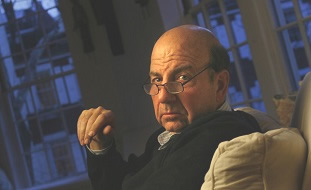
Calvin Trillin (Kansas City, 5 december 1935)
De Russische dichter Afanasy Afanasievich Fet werd geboren op 5 december 1820 nabij Mzensk. Zie ook alle tags voor Afanasy Fet op dit blog,
I always s like the northern birches
I always s like the northern birches:
Their view, so downcast and grave,
The fever, which poor souls scorches,
Cools like the mute speech of a grave.
But yet, the willow, which branches,
With their long leaves, cast in a flood,
Is closer to a dream, that scourges,
And longer lives in our heart.
Deploring groves their own,
Their meadows – with bitter tears,
Tell birches to cold wind alone
Their common sufferings and fears.
Believing that the whole ground
Is motherland of sacred grieves,
The weeping willow all around
Inclines its branches with long leaves.
Vertaald door Yevgeny Bonver
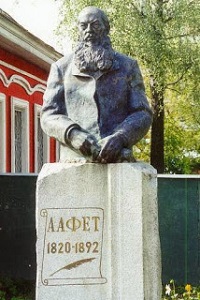
Afanasy Fet (5 december 1820 – 3 december 1892)
Monument bij zijn voormalige huis, nu museum in Orjol
De Duitse schrijver Hans Hellmut Kirst werd geboren op 5 december 1914 te Osterode (voorm. Ost Preussen, nu Polen). Zie ook alle tags voor Hans Hellmut Kirst op dit blog.
Uit:08/15
„Jeden Samstagnachmittag beherrschte er die Kaserne. Hauptmann Derna, der Chef, anläßlich des Anschlusses von Österreich großmütig der großdeutschen Wehrmacht zur Verfügung gestellt, widmete sich seiner werdenden Familie; Leutnant Wedelmann, der Batterieoffizier, seiner jeweiligen Braut. Selbst »Knollengesicht« Luschke, Major und Abteilungskommandeur, pflegte das Wochenende zu heiligen. Der Spieß aber veranstaltete dann ungestört »Abschlußfeiern«, wobei er zäh und nicht ohne Erfolg bemüht war, der Batterie klarzumachen, »wer eigentlich Chef im Laden ist«. »Rührt euch!« rief der Hauptwachtmeister. Die Soldaten in den Drillichanzügen setzten automatisch den linken Fuß weg. Der Spieß lauerte kurz darauf, ob es einer wagen würde, zu sprechen, denn bei ihm war »Rührt euch« nicht gleichbedeutend mit Sprecherlaubnis, die er stets gesondert zu erteilen pflegte. Keiner sprach.
»Es darf gesprochen werden«, rief er gönnerhaft.
Die Soldaten zogen es vor, zu schweigen. Einige grinsten lautlos und ausgedehnt; einige sahen den Spieß dienstbereit an. Nur der Gefreite Asch, der mitten unter den Eingeteilten stand, schob den Gefreiten Wagner, Richard mit Vornamen, kräftig zur Seite und sagte: »Mach dich nicht so breit, du Armleuchter!« »Brüllen Sie hier nicht, Asch!« rief der Spieß sofort. »Wenn hier einer brüllt, bin ich das.« »Jawohl, Herr Hauptwachtmeister!« trompetete Asch zustimmend.
Hauptwachtmeister Schulz beschloß in einer Anwandlung von Großmut, sich nicht herausgefordert zu fühlen. Er rief die Funktionsunteroffiziere an seine Seite und übergab ihnen die Eingeteilten, die sofort eilig verschwanden, um auf Kammern und in Schuppen die Zeit totzuschlagen. Der Gefreite Asch bezog im Altmännertempo seinen Stammplatz auf der Bekleidungskammer, wo er gewöhnlich mit Wachtmeister Werktreu, dem zuständigen Funktionsunteroffizier, »Siebzehnundvier« zu spielen pflegte und sich dabei Mühe gab, nicht sonderlich zu gewinnen."
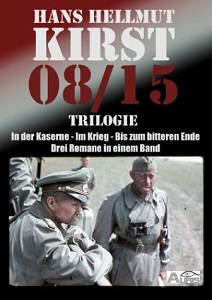
Hans Hellmut Kirst (5 december 1914 - 23 februari 1989)
Zie voor nog meer schrijvers van de 5e december ook mijn blog van 5 december 2011 deel 2 en ook mijn blog van 5 december 2010 en eveneens mijn blog van 5 december 2009.
|



